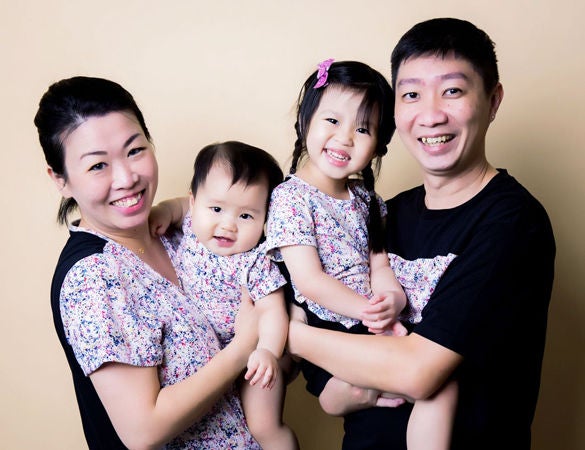
Ms Pearlie Quek is KK Human Milk Bank's top donor this year. She is with her husband Lam Kok Sion and their daughters, Chloe (left) and Charlotte. PHOTO: COURTESY OF PEARLIE QUEK
Ms Pearlie Quek had so much breast milk, she was feeding not only her two girls but also countless others every month.
The working mum donated almost 220 litres from August last year to June this year, making her KK Human Milk Bank's top donor this year.
"I'm blessed with all this breast milk, so why not donate it to those mothers and babies who really need it?" says Ms Quek, 41, a civil servant.
She had passed by the KK Human Milk Bank in KK Women's and Children's Hospital (KKH), but it was only when her elder daughter, Chloe, was warded in the neonatal intensive care unit (NICU) that she saw first-hand how breast milk makes a precious difference to babies fighting for their lives.
Chloe suffers from duodenal atresia, a congenital disorder where part of the small intestine is blocked.
Her 16-day stay in the NICU in 2018 meant she had nipple confusion when she returned home and could not nurse directly.
"Every time I tried and she screamed, I cried with her in the room," recalls Ms Quek, whose two children were conceived via in-vitro fertilisation.
She sought help from a lactation consultant who assured her that she could still bond with her baby.
What Ms Quek could not do directly, she more than made up for in expressed breast milk.
She even bought a deep freezer. It came in handy when she gave birth to Charlotte in July last year and started donating her breast milk soon after her confinement period.
As a breast milk donor, she had to take a blood test and answer a checklist of questions every three months, as well make sure her milk was safe for donation from the expressing to storage stages.
Her job as a civil servant requires her to work out of the office some of the time, so she had to find suitable places to express on the go with a nursing cover for privacy. When she contracted Covid-19 in March, she stopped donating for about two weeks.
She reckons she donated about 22 to 25 litres a month and stopped as KKH does not accept breast milk from mothers with babies aged 12 months or older.
This is because the composition of breast milk changes over time and the recipients are newborns, says Associate Professor Chua Mei Chien, director of the KK Human Milk Bank.
The hospital provided the milk bags and a courier service to pick up her donations - the latter is no longer available to new donors but the hospital is "exploring other ways to increase accessibility for donors and community recipients", says Prof Chua, who is also head and senior consultant at KKH's Department of Neonatology.
While well-intentioned relatives questioned the time and effort she spent on expressing milk for others, Ms Quek credits her husband, Mr Lam Kok Siong, 43, also a civil servant, for being her most staunch supporter.
On weekends when the kids were clamouring for her, for example, he would take them aside and play with them so she could pump in peace.
"Family members of the babies in NICU are going through a very hard time. I know as I have been through the journey, from travelling to KKH to accompany their baby, especially during their confinement period, to staying strong and praying for their baby to grow up healthy," she says.
"It is not easy for the mothers, as they are mentally and physically stressed, especially if they do not have enough supply of breast milk. I am happy that I could help a bit."
Find out more about the KK Human Milk Bank at KKH's website. KKH is also organising a free online forum on Aug 6 titled Raising a Healthy Breastfed Baby from Birth. Register here













 Get it on Google Play
Get it on Google Play